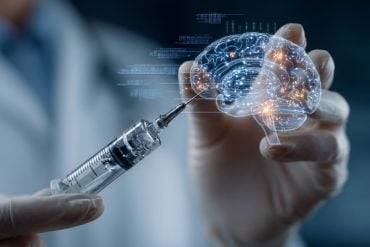Summary: A new study reports the gut microbiota can modulate serotonin transporter activity.
Source: University of Exeter.
Researchers have found evidence that could shed new light on the complex community of trillions of microorganisms living in all our guts, and how they interact with our bodies
Scientists at the University of Exeter Medical School and University of Zaragoza in Spain studied a protein known as TLR2, a critical detector of the microbiota found in the intestine. They found that it regulates levels of serotonin – a neurotransmitter which carries messages to the brain, and is also found in the gut, where it regulates our bowel routines.
The research, carried out in cell cultures and verified in mice, provides strong evidence that microbiota can interfere with human physiology by modulating the serotonin transporter activity. Serotonin transporter is a target for numerous diseases and it seems that microbiota living in our guts is able to interfere with this transporter, controlling our serotonin levels.
The finding, published in PLOS ONE, comes as scientists across the world are working to understand the complicated interactions between the “invisible world” of the microbiota in our bodies and the impact they have on our health and even our moods. Recently, scientists in California found evidence that the bacteria in the gut play a role in causing Parkinson’s Disease.
It may also help explain how the microbiota in our guts affect our physiology. Inflammatory bowel disease is thought to be triggered when TLR2 is not functioning properly, but so far, the mechanisms behind this have not been fully understood. This study aimed to further this understanding, and was supported the Foundation for the Study of Inflammatory Bowel Diseases in Aragón (ARAINF), in Spain.
Dr Eva Latorre, a postdoctoral researcher at the University of Exeter Medical School, said the new finding helped to further understanding in a fast-growing research area. She said: “This paper has concluded that the protein TLR2 alters the availability of serotonin, which is important in a range of conditions from depression to inflammatory bowel disease. It is early days in this research though. We need to understand much more about the relationship between the microbiota in our guts and how they interact, before we can hope to harness effective new treatments.”

The research team examined human cells in a model of the intestine in the laboratory, looking at how they express proteins and RNA – activities which regulate how they behave. They found that TLR2 controls serotonin transporter – obtaining the same result in studies on mice.
Principal investigator of this study, Professor José E Mesonero, at the University of Zaragoza, said: “This paper opens our minds about the complex universe of this forgotten organ: the microbiome. We have concluded that TLR2 not only can detect microbiota, but also modulate serotonin transport, one of the crucial mechanism in neurological and inflammatory diseases. Much has to be yet studied, but this work can improve our understanding about the connection between gut and brain thought microbiota.”
Source: Louise Vennells – University of Exeter
Image Source: NeuroscienceNews.com image is in the public domain.
Original Research: Full open access research for “Intestinal serotonin transporter inhibition by Toll-like receptor 2 activation. A feedback modulation” by Eva Latorre, Elena Layunta, Laura Grasa, Marta Castro, Julián Pardo, Fernando Gomollón, Ana I. Alcalde, and José E. Mesonero in PLOS ONE. Published online December 29 2016 doi:10.1371/journal.pone.0169303
[cbtabs][cbtab title=”MLA”]University of Exeter “Gut Microorganisms Affect Our Physiology.” NeuroscienceNews. NeuroscienceNews, 29 December 2016.
<https://neurosciencenews.com/physiology-gut-microorganism-5831/>.[/cbtab][cbtab title=”APA”]University of Exeter (2016, December 29). Gut Microorganisms Affect Our Physiology. NeuroscienceNew. Retrieved December 29, 2016 from https://neurosciencenews.com/physiology-gut-microorganism-5831/[/cbtab][cbtab title=”Chicago”]University of Exeter “Gut Microorganisms Affect Our Physiology.” https://neurosciencenews.com/physiology-gut-microorganism-5831/ (accessed December 29, 2016).[/cbtab][/cbtabs]
Abstract
Intestinal serotonin transporter inhibition by Toll-like receptor 2 activation. A feedback modulation
TLR2 is a microbiota recognition receptor that has been described to contribute to intestinal homeostasis and to ameliorate inflammatory intestinal injury. In this context, serotonin (5-HT) has shown to be an essential intestinal physiological neuromodulator that is also involved in intestinal inflammatory diseases. Since the interaction between TLR2 activation and the intestinal serotoninergic system remains non-investigated, our main aim was to analyze the effect of TLR2 on intestinal serotonin transporter (SERT) activity and expression and the intracellular pathways involved. Caco-2/TC7 cells were used to analyze SERT and TLR2 molecular expression and SERT activity by measuring 5-HT uptake. The results showed that apical TLR2 activation inhibits SERT activity in Caco-2/TC7 cells mainly by reducing SERT protein level either in the plasma membrane, after short-term TLR2 activation or in both the plasma membrane and cell lysate, after long-term activation. cAMP/PKA pathway appears to mediate short-term inhibitory effect of TLR2 on SERT; however, p38 MAPK pathway has been shown to be involved in both short- and long-term TLR2 effect. Reciprocally, 5-HT long-term treatment yielded TLR2 down regulation in Caco-2/TC7 cells. Finally, results from in vivo showed an augmented intestinal SERT expression in mice Tlr2-/-, thus confirming our inhibitory effect of TLR2 on intestinal SERT in vitro. The present work infers that TLR2 may act in intestinal pathophysiology, not only by its inherent innate immune role, but also by regulating the intestinal serotoninergic system.
“Intestinal serotonin transporter inhibition by Toll-like receptor 2 activation. A feedback modulation” by Eva Latorre, Elena Layunta, Laura Grasa, Marta Castro, Julián Pardo, Fernando Gomollón, Ana I. Alcalde, and José E. Mesonero in PLOS ONE. Published online December 29 2016 doi:10.1371/journal.pone.0169303






